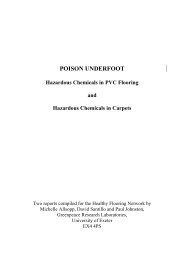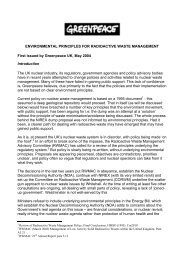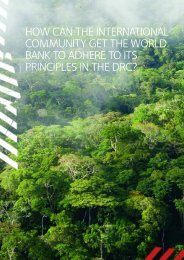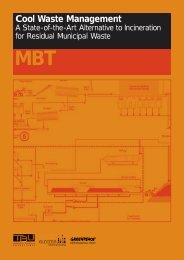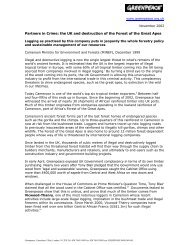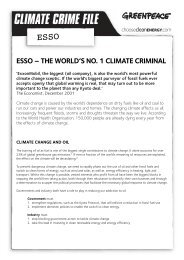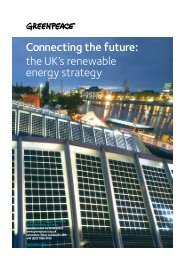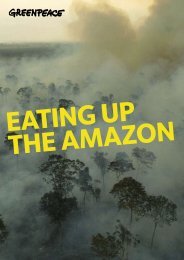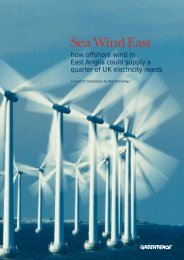The Real Green Revolution - Greenpeace UK
The Real Green Revolution - Greenpeace UK
The Real Green Revolution - Greenpeace UK
You also want an ePaper? Increase the reach of your titles
YUMPU automatically turns print PDFs into web optimized ePapers that Google loves.
NGOs unable to realise their projects and<br />
programmes due to a lack of funding – often,<br />
by industrialised country standards, involving<br />
very small amounts of money.<br />
Knowledge in the industrialised world of<br />
NGO activity in the South can never hope<br />
to be complete, but this re p o rt has identified<br />
a number of diff e rent and innovative pro j e c t s .<br />
One Nort h e rn initiative to help pro m o t e<br />
recognition of the achievements of Southern<br />
NGOs working in this field (which also<br />
p rovides them with some financial assistance<br />
in the form of prize money)<br />
is the Sustainable Agriculture and Rural<br />
Development Prize (SARD). This prize,<br />
initiated in 1997 by a German agro n o m i s t ,<br />
F rederick von Mallinckrodt, is an<br />
a g roecological equivalent of the ‘Right<br />
Livelihood Aw a rds’ and helps draw attention<br />
to the successes and achievements of Southern<br />
NGOs (Ecology and Farming, 2001).<br />
Case study 4 – World Food Day Farmers’ and<br />
F i s h e r m e n s’ ’ Movement (Indonesia)<br />
This case study focuses on the activities of<br />
one Southern NGO, to illustrate how the<br />
support and development of organic farming<br />
forms part of far broader ‘farmer first’ rural<br />
development strategies. Though organic<br />
agriculture is important it is also inextricably<br />
interwoven with other development<br />
objectives and strategies.<br />
<strong>The</strong> (Indonesian) World Food Day Farmers’<br />
and Fishermen’s Movement (WFDFFM)<br />
is part of an international movement<br />
celebrating the role of, and contribution<br />
made by, food producers across the world.<br />
It was founded in October 1990 on the first<br />
celebration of World Food Day, which<br />
coincides with the founding of the FAO.<br />
<strong>The</strong>se annual celebrations continue to be<br />
a focal, festive event in the calendar, when<br />
local, regional and national events are held.<br />
<strong>The</strong>se festivals help farmers and fishermen<br />
experience a sense of global solidarity.<br />
<strong>The</strong>y also act as important publicity and<br />
recruitment opportunities.<br />
<strong>The</strong> main aims of WFDFFM are set out in<br />
‘<strong>The</strong> Ganjurun Declaration’. <strong>The</strong>y include<br />
promoting sustainable patterns of<br />
production and consumption and, through<br />
these, promoting ‘total sustainable human<br />
development’.<br />
<strong>The</strong> main activities in which the WFDFFM<br />
Secretariat is involved include:<br />
• 'Gaduhan': an initiative that helps poor<br />
farmer groups obtain cattle, with the aim<br />
of increasing incomes and soil fertility.<br />
<strong>The</strong> WFDFFM loans cattle to farmers<br />
groups for two breeding seasons. <strong>The</strong><br />
progeny are then shared.<br />
• Community-based seed bank: this activity<br />
begins by helping develop farmers’<br />
awareness of the importance of their<br />
seeds. Trial farms / plots are then<br />
established with farmers’ groups to<br />
experiment with seed and plant breeding.<br />
Results are discussed after harvest and the<br />
favoured crops are saved in a village seed<br />
bank. <strong>The</strong> final stage is that of breeding<br />
and distributing the seeds. As well as<br />
developing seed banks, this activity also<br />
develops local capacity in seed breeding.<br />
• Assistance with organic/sustainable<br />
farming: this programme explains the<br />
drawbacks of conventional farming<br />
systems and provides advice, assistance<br />
and visits to demonstration organic farms,<br />
so farmers can learn alternative methods<br />
for themselves.<br />
• Promoting ‘alternative’ marketing:<br />
through an attempt to build alternative<br />
marketing links, based around the<br />
Japanese teikei model, adapted to local<br />
situations.<br />
• Advocating farmers’ rights: WFDFFM<br />
30


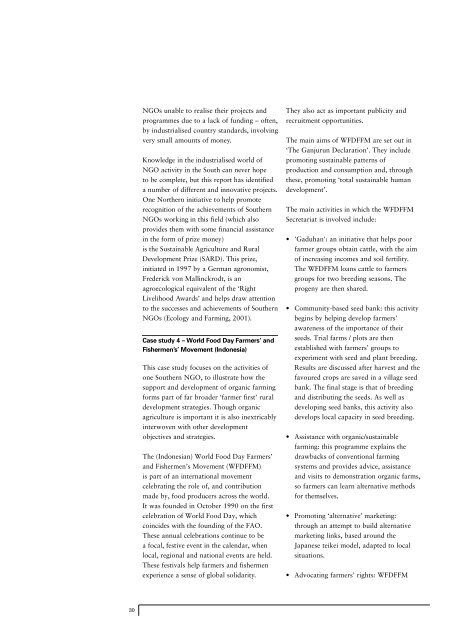
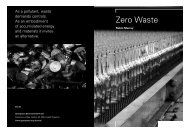
![[2007] EWHC 311 - Greenpeace UK](https://img.yumpu.com/22079793/1/184x260/2007-ewhc-311-greenpeace-uk.jpg?quality=85)
